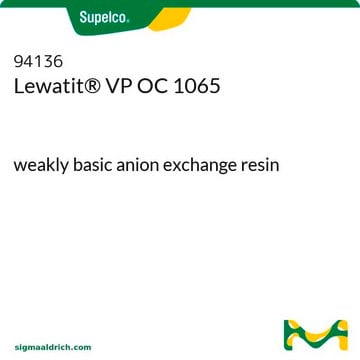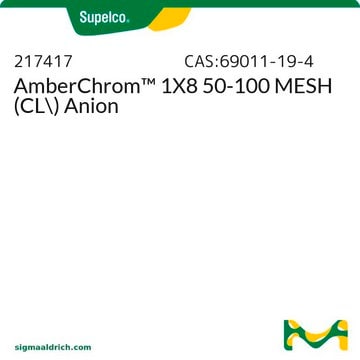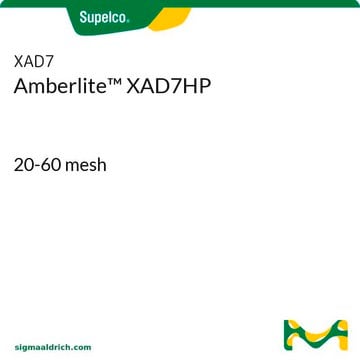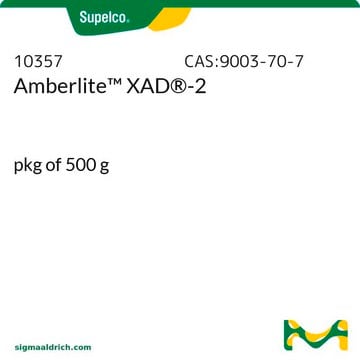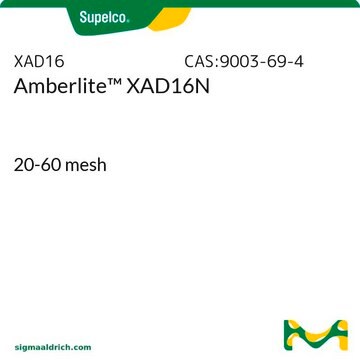62107
Lewatit® MonoPlus TP 214 Ion Exchange Resin
macroporous, 30-35 mesh
Sign Into View Organizational & Contract Pricing
All Photos(1)
About This Item
Recommended Products
product name
Lewatit® MonoPlus TP 214, ion exchange resin, macroporous
Quality Level
form
macroporous
moisture
43-48%
technique(s)
LPLC: suitable
loss
40-60% loss on drying, 110 °C
matrix
styrene-divinylbenzene (macroporous)
matrix active group
thiourea functional group
particle size
400-1250 μm
capacity
1.0 meq/mL by wetted bed volume
separation technique
affinity
Related Categories
General description
Lewatit MonoPlus TP 214 is a type of chelating ion-exchange resin.
Application
Lewatit MonoPlus TP 214 may be used as a mercury-specific adsorber resin for the removal of mercury from contaminated groundwater samples prior to its determination by cold vapor atomic absorption spectrometry (CV-AAS). It may also be used as an ion-exchange resin for the determination of platinum and palladium in particles emitted from automobile exhaust catalysts prior to their analysis using cathodic adsorptive stripping voltammetry (CASV).
Chelating resin especially suited for the removal of metals in hydrometallurgical processes and for the extraction/recycling of mercury and silver.
Legal Information
Lewatit is a registered trademark of Lanxess Deutschland GmbH
Storage Class Code
11 - Combustible Solids
WGK
WGK 3
Flash Point(F)
Not applicable
Flash Point(C)
Not applicable
Personal Protective Equipment
dust mask type N95 (US), Eyeshields, Gloves
Choose from one of the most recent versions:
Already Own This Product?
Find documentation for the products that you have recently purchased in the Document Library.
Kimberly C Martin et al.
Journal of anatomy, 230(6), 766-774 (2017-04-04)
Branching morphogenesis of epithelia involves division of cells into leader (tip) and follower (stalk) cells. Published work on cell lines in culture has suggested that symmetry-breaking takes place via a secreted autocrine inhibitor of motility, the inhibitor accumulating more in
Sandra Nickel et al.
NPJ Regenerative medicine, 6(1), 84-84 (2021-12-05)
Post-surgery liver failure is a serious complication for patients after extended partial hepatectomies (ePHx). Previously, we demonstrated in the pig model that transplantation of mesenchymal stromal cells (MSC) improved circulatory maintenance and supported multi-organ functions after 70% liver resection. Mechanisms
Determination of Pt and Pd in particles emitted from automobile exhaust catalysts using ion-exchange matrix separation and voltammetric detection.
Paraskevas M, et al.
Microchimica Acta, 176(1-2), 235-242 (2012)
Hardin Bolte et al.
Journal of virology, 93(4) (2018-11-23)
The genome of influenza A virus is organized into eight ribonucleoproteins, each composed of a distinct RNA segment bound by the viral polymerase and oligomeric viral nucleoprotein. Packaging sequences unique to each RNA segment together with specific nucleoprotein amino acids
Birga Soetje et al.
Frontiers in genetics, 11, 248-248 (2020-04-16)
Three-dimensional culture systems that allow generation of monolayered epithelial cell spheroids are widely used to study epithelial function in vitro. Epithelial spheroid formation is applied to address cellular consequences of (mono)-genetic disorders, that is, ciliopathies, in toxicity testing, or to
Our team of scientists has experience in all areas of research including Life Science, Material Science, Chemical Synthesis, Chromatography, Analytical and many others.
Contact Technical Service